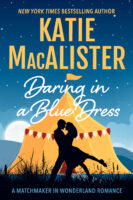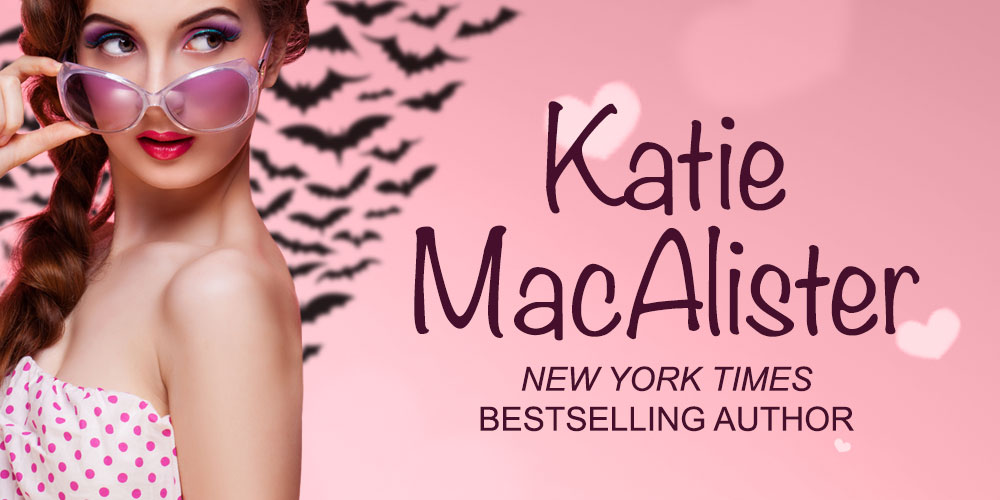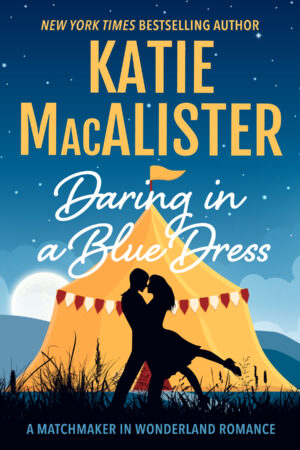Chapter One
“If there is anything worse than a sister-in-law afflicted by pregnancy hormones,” Emanuel Alden Ainslie commented to his brother, “it’s a sister-in-law afflicted by pregnancy hormones while planning to marry off every available male within a five-kilometer range.”

“Don’t be ridiculous,” Elliott Ainslie, eighth Baron Ainslie, scoffed, watching with a smile as Alice sat chatting with the dowager baroness on the newly rebuilt stone verandah.
Alden was a bit jealous of the emotion behind that smile, although he certainly wouldn’t mention that. Not now. Not when Alice had decided that matchmaking was her new hobby.
“She’s not trying to pair off every unattached male,” Elliott continued. “Just you lot. She said, and I believe I’m quoting her accurately, that there was no sense in Mum and Dad adopting ten children if she—Alice—couldn’t find her many brothers-in-law women to make them all as happy as she made Gunner and me.”
Alden looked from his oldest brother, Elliott, to the second oldest, Gunner. The three men had climbed to the top of the restored tower in order to verify the recent repair work had been done according to Elliott’s expectations. “I must have missed the part where Alice found Lorina for you, Gun. I thought she was part of that archaeology show that filmed here last year?”
“She was,” Gunner answered, smiling when his wife of six months strolled out to join the other two ladies as they sipped lemonade, ate a copious amount of seedcake—the current focus of Alice’s food cravings—and made plans for god only knew what. “Alice is stretching it a bit to claim our meeting as one of her triumphs, but Lorina had met her some years ago, so we don’t mind if she adds us to her matchmaking curriculum vitae.”
Alden peered over the edge of the tower, and looked down at the three women on the verandah. Although Alice had been installed at the castle as its chatelaine for more than a year, he’d met her only half a dozen times. She was pleasant enough, as was Gunner’s bride, but of late . . . He sighed. “I could do without her turning her sights on me.”
“Who? Alice?” Elliott stopped smiling at his wife and glanced at Alden. “I thought you liked her.”
Alden sensed the undercurrent of warning in Elliott’s voice. “I do like her. She’s funny. I like a sense of humor in a woman. But . . . it’s just . . . you know me. I’m not very comfortable around women.”
“You’re shy, that’s all,” Gunner said, glancing at his mobile phone. “It’s nothing you can’t overcome with a little work. Try one of those speed-dating setups. That will force you to meet a large number of women, so many you will have to be extroverted by sheer act of preservation.”
Alden grimaced. There was nothing worse than speed dating that he could think of short of gelding or global nuclear war, and frankly, he’d question the war being as bad as the idea of meeting a bunch of strangers, especially female strangers. “Can’t Alice pick on one of our other brothers? Surely some of them aren’t dating anyone.”
“She could, and she no doubt will at some point, but for now, she’s insisting that it’s time you settle down.”
“You’re over thirty, Alden,” Gunner said with a nod. “You’re not getting any younger.”
“Exactly. And more to the point, Alice is pregnant,” Elliott said as if everyone in the immediate area didn’t already know that. “She has . . . fancies. And if one of those fancies is to find a woman for the next brother, chronologically speaking, then, by god, you are going to humor her.”
“Josiah is older than me,” Alden protested. “She should be focusing on him, and letting me get on with life.”
“He’s only a few days older than you, and since he’s out of the country, Alice decided it was time you were made deliriously happy.”
Alden made a face. “But I don’t want to be deliriously happy! I just want to be left alone.”
“To do what?” Gunner asked him, the men slowly making their way down the stone spiral staircase to the ground floor. “Go back to university? You’ve already earned more degrees than all the rest of us put together.”
“I like learning new things,” Alden said stubbornly. “There’s nothing wrong with having a curiosity, and wanting to learn more about life, you know.”
“There is when you are part of the drain on the already stressed estate income,” Elliott said firmly. “We’ve had this out already, Alden—I simply can’t support you any longer.”
“Which is why I’m flipping Bestwood Hall. I should make a packet off of it.”

“Bestwood,” Gunner said with an obvious roll of his eyes. “That monstrosity. Whatever possessed you to take every last pound you had and invest it in a decaying old house out on the edge of nowhere?”
“And more importantly, why do you think you can sell it at profit?” Elliott, the more practical brother, asked as they emerged into the sunshine of the early summer day. “If no one but you was willing to buy it, why do you think slapping a bit of paint around will increase the value?”
“The solicitor said that Lady Sybilla sold the house to me because she liked my name,” Alden said with as much dignity as he could muster. “I’m sure there were any number of other interested parties. In fact, I know there were—the estate agent who put the deal together for me said that someone had asked if I was willing to part with it. And that was less than a week after I closed on the sale. So you see, you annoying brothers of mine, I’m not the fool you think I am.”
“Is that so?” Elliott paused and tipped his head to the side. “How much was the offer?”
“Well . . . as to that . . .” Alden gave a little cough.
“As I thought. Less than what you paid for it?” Elliott asked.
“Perhaps.” Alden tried to look down his nose at his eldest brother, but unfortunately, at that moment they’d emerged onto the verandah, and both Elliott and Gunner had all their attention focused on their respective women.
Once again, Alden was aware of a little pang of jealousy. No, not jealousy, he decided as he strolled over to the table, and accepted a glass of lemonade. Envy. Perhaps it wouldn’t be so bad if Alice were to find a woman for him. Perhaps the hellish nightmare of meeting someone new wouldn’t be quite so terrible if Alice prepared the ground for him. Perhaps . . .
“Alden!” Alice said brightly, pushing a white metal chair at him. “Just the man I wanted to see. Now, I promised you I’d find a woman for you, and I’ve done it.”
Perhaps he was out of his mind.
Panic swamped him at the thought of a woman expecting him to be romantic. To court her. Hell, even the thought of dinner with a woman made his palms sweat. He gulped down the lemonade, thrust the glass onto the table, and said hurriedly, “No time to chat. Must dash. Have to be at Bestwood first thing in the morning, and I have to pack.”
“But—you haven’t heard anything about the woman I found for you,” Alice said, a frown on her brow.
“Later,” he said loudly over his shoulder, bolting for the nearest door.
“I’ll send her down to Bestwood Hall to meet you,” Alice called after him. “She’d probably like to help—”
The slam of the library door thankfully cut off the rest of her comments. Alden hurried up the stairs, to the small room at the back of the castle that had traditionally been his when he was in residence.
“Stupid, stupid, stupid,” he said aloud, thrusting various pieces of clothing into a couple of suitcases. “You’re a grown man. It’s just stupid that the thought of meeting women puts you in such a panic. Gunner’s right—you need to just get a grip, go to a bar, and start talking to the nearest woman.”
A little shudder ran through him at that thought. He swept through the room, dumping books, photos of family, and his collection of antique astronomical equipment into the two bags, all the while lecturing himself on the futility of being such an idiot. The lecture did little good—he’d been over it all so many times before—but the familiarity of it provided an odd sort of comfort, at least enough that his heart was no longer racing, nor were his hands shaking by the time he got his bags loaded into the Mini Cooper that he’d bought from a former university roommate.
“You’re not leaving now, are you?” Elliott asked a few minutes later when Alden ran him to earth in the room that Elliott used as his office. He was seated at a laptop, and was no doubt writing away on his latest book. “I thought you were leaving in the morning. Surely you can stay to dinner.”
“It’s better if I’m off now. It’ll take me almost eight hours to drive to Bestwood, and if I get in late tonight, I’ll be ready to start the renovations first thing in the morning.”
Elliott rose from his desk and came around it, embracing Alden in a bear hug. “You don’t have to date this woman, you know.”

“What woman?” Alden asked, a spike of panic shooting through him. Dear god, had Alice brought the woman to Ainslie Castle during the time he’d been packing?
“Alice’s old college friend. The one she thought would be perfect for you. I know the last thing in the world you want to do right now is think about dating, but I’d appreciate it if you were polite to her when she shows up at your eyesore.”
Alden made a face. “That’s what I need, a woman hanging around expecting me to entertain her when I will have loads of work ahead of me. Couldn’t Alice—”
“No. Trust me, this is the best way. If you don’t like her—and love Alice as I do, I have to admit that she’s not necessarily the great matchmaker she thinks she is—then you can simply cry off by telling the woman you have work to do. Just show her around the house, that’s all I ask. You can do that for us, can’t you?”
“I suppose,” Alden replied, aware he sounded ungracious. He added, “It’s not that I have anything against your wife. It’s just . . .”
Elliott gave him another hug, then clapped a hand on his shoulder, and walked out to the back drive with him. “I know. It’s not easy for you. Just don’t try so hard to be a scintillating conversationalist.”
Alden laughed. “I’d settle for being able to talk without my tongue twisting around itself.”
“You’re a smart man. You have the Ainslie charm, when you let people see it. Stop worrying so much about what others think, and just be yourself.”
“I try, El,” he said, his shoulders slumping in defeat. “But it just doesn’t come to me the way it does to the rest of you.”
“Think of it as a game,” Elliott said, stopping at the door to the car. “And, Alden?”
Alden opened the door and tossed in a small backpack. “Yes?”
Elliott smiled. “Stay out of trouble, all right? I’m tied up with this book, and the baby coming in a few months, and I really don’t want to have to rescue you like I did Gunner.”
“I have absolutely no intention in getting myself locked into the bowels of Bestwood Hall,” Alden replied with much dignity.
“See that you don’t.”
Alden waved as he fired up the car, and, with a little spray of gravel that had Elliott shouting abuse, zoomed down the drive, and off to his new life. Despite the threat of Alice’s friend hanging over his head like a particularly depressing cloud, his spirits rose at the thought of what lay ahead of him.
“Bestwood,” he said aloud, enjoying the way the word sounded. “Bestwood Hall. Not a manor, not an abbey, but a hall. Why, hello, how do you do? This? Yes, that’s Bestwood Hall. I own it. I am the master of Bestwood Hall. Heh. That sounds like a Victorian melodrama: The Mystery of Bestwood Hall. The Ghost of Bestwood Hall. Big Bouncing Baby Bustles of Bestwood Hall.”
He amused himself for a while with titles; then his mind drifted over the work that lay ahead of him. Buying the house wasn’t difficult—he’d heard about it from Toby, one of his many former university roommates, who was now a solicitor dealing with complex wills and estates.
“You’re looking for a house, right?” Toby had said some three months earlier, when Alden had run out of funds and been forced to take a job working under the table for a less-than-scrupulous builder. “Something you can fix up and sell for a profit?”
“I am,” Alden said, a little flare of hope burning inside him. “But I don’t have much capital. One of my biological relations left me a small amount in an antiquated trust, and my brother Elliott convinced the trustee to release the funds if they were used to purchase a property.”
“Your biological . . . oh, that’s right, you’re adopted. I forgot that your family was . . .”

“Multicultural,” Alden said, coming to Toby’s rescue. “That’s the politically correct term for Mum and Dad adopting kids from whatever country took their fancy. A few of my brothers are from Africa, a couple from what used to be the Eastern bloc, and the rest of us from assorted locations elsewhere. My biological family was from Scotland, and Mum kept in contact with them on my behalf until I was old enough to decide if I wanted to know them or not.”
“And do you?” Toby asked, clearly intrigued.
“I would have if they hadn’t all died off.” Alden shrugged. “I didn’t get to meet any of them, but that didn’t stop a distant cousin from leaving me the little trust, albeit a frustrating one.”
“I hate those trusts,” Toby said in an acid tone. “The kind that are tied with the most annoying red tape that you can imagine. Just last week our senior partner dropped a heinous case on me involving not one but two entailments . . . but I digress.”
“Do you have a house for me to look at?” Alden asked, hoping against hope that the property would be within his means, both monetarily and with regard to renovation. “Where is it? More importantly how much is it?”
“It’s an old house—Tudor, I think—although I don’t know that you’d want it. It’s barely habitable. The old man who owned it was not only a miser but a recluse. He lived there for more than eighty years, along with his wife and a couple of crusty servants, leaving behind a mountain of debts that his widow couldn’t possibly pay in her lifetime. A local bank took charge of the house last year due to the debts, and I’ve just heard from an old friend at the bank that they’re looking for a buyer.”
“There’s bound to be lots of people interested in a historical property,” Alden protested, his hopes dashed. He rather liked the idea of restoring a Tudor house. It appealed to his fascination with history.
“Normally, I’d agree. But according to Tom Scott, my friend at the bank, the managers are trying to manage the sale for Lady Sybilla in such a way as to not upset her.”
“That seems a bit odd. A bank caring about someone who’s lost possession of their house, that is.”
“Ah, but you aren’t factoring in the element of ye old family retainer,” Toby told him. “Tom says the bank managers insist on handling the situation with kid gloves. There’s an old family connection, or something of that sort, I gather. So rather than putting the place on the market and fetching the highest price, they’re looking for someone to agree to their terms so they can avoid the publicity that would go along with a public sale.”
“The managers must really like the old lady,” Alden said thoughtfully, wondering if he dared hope that his meager trust would cover the sale of a historic house and land.
“Well, there are conditions that go with the sale, of course,” Toby said.
Alden nodded, even though his friend wouldn’t see the gesture. “I had no doubt there would be. Something prohibitive, no doubt.”
“Not horribly so, actually. Tom told me the gist of the restrictions. . . . I know I wrote it down just in case you’d be interested. . . . Ah, here it is. The buyer must grant Lady Sybilla the right to stay on the estate in the gatehouse for the duration of her life. Also, the house can’t be demolished with the purpose of rebuilding, and any restorations must be done in a manner appropriate to the style of the existing structures. All pretty benign restrictions, if you ask me.”
“And how much are they asking for the house?”
Alden’s eyes widened when Toby went into specifics. Buying the house would wipe out not only his trust, but also the carefully nurtured nest egg he’d built up over the last eighteen years. It wouldn’t leave him with any funds to hire people to do restoration work, which meant he’d have to do it all himself.
“That’s an awful lot of money,” he said at last.
“Too much for you?”
“No.” He thought for a few minutes more. “Is there . . . this is going to sound very crass, but are there any restrictions about selling the house once it’s legally mine?”
“No,” Toby said slowly, the rustle of papers evident. “No, I don’t see anything about selling it. There’s the stipulation that Lady Sybilla be allowed residence in the gatehouse for her lifetime, but other than that, I don’t see anything that would keep you from selling. Do you plan on selling soon?”

“Not right away. What I thought I’d do is get the place fixed up. You know, renovate it, and maybe update a few things like the plumbing and heating, and then sell it.”
“Ah. What the Americans call flipping a house. Very smart, if you ask me. Although you’d have to take into account Lady Sybilla’s presence on the estate.”
“Yes, well, without intending to be either heartless or crass, in all likelihood, it’ll take me a year or two to fix the house up if I have to do it by myself, and by then . . .”
“By then Lady Sybilla would have gone to her just reward,” Toby finished for him. “A very valid point, Alden. Very valid indeed, and I can’t see anyone taking issue with you for selling the place once she’s gone.”
And thus it had come about that the bank invited him to tour the house and grounds, and after a whirlwind tour through both—without catching sight of Lady Sybilla, who evidently rested in the afternoon—his offer was approved.
“Today it’s all mine,” he said to himself as he drove west, the sun dipping low until a rich, velvety navy blue began to claim the sky. “I’m a homeowner. A hall owner. I’m Alden Ainslie of Bestwood Hall. . . . At least I am for the present. No telling where I’ll be once I fix the house up. After all, this could be the start of a brand-new career. People make millions doing this sort of thing—why can’t I? It’s just a matter of fixing things up to look nice, and then capitalizing on the market. Yes, this is going to be good. It’s going to be very good.”
The optimism stayed with him for three hours until his transmission decided it had enough and failed completely, stranding him for the night in a small town. He left a message with the solicitor’s office where he was to pick up the keys to Bestwood, and settled down as best he could in a dingy hotel located across the street from the car repair shop.
“Not an auspicious start,” he told himself as he eyed the sagging bed. “But that’s not a bad thing. Things can only go up from here.” There were times when he was astounded with just how unprescient he could be.









